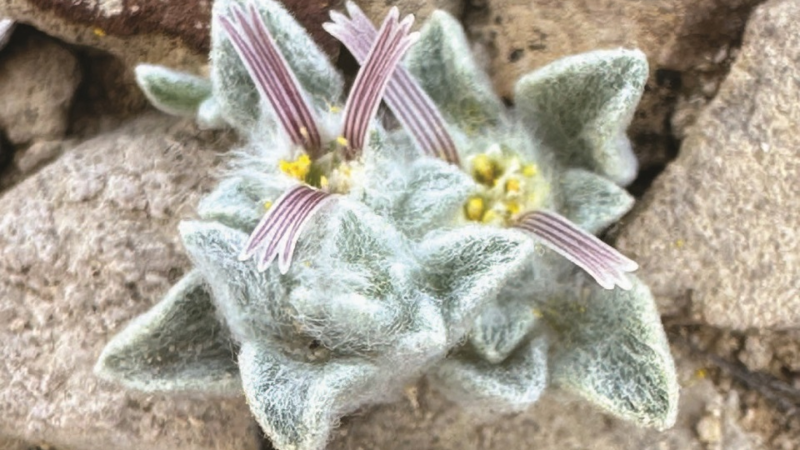Meet the ‘wooly devil,’ a new plant species discovered in Big Bend National Park
Say hello to the wooly devil. The type of sunflower is a new plant species, identified in Big Bend National Park in Texas.
Ovicula biradiata, as it is formally known, is especially notable for being the simultaneous discovery of a new species and genus.
The findings were published last week in the peer-reviewed journal PhytoKeys.
The plant was found on a hike in the park’s backcountry in March 2024 by park volunteer Deb Manley and Cathy Hoyt, a park interpretive operations supervisor.
When Manley uploaded photos to the community science app iNaturalist, botanists got excited.
“That kind of caused an uproar — it caused an email chain of different botanists emailing each other,” says Isaac Lichter Marck, a post-doctoral research fellow at the California Academy of Sciences who was part of the research.
A whole team assembled to study samples of these plants.
“It was very clear at first that it was a member of the sunflower family, because all members of the sunflower family have flowers that are made up of a bunch of flowers put together,” Lichter Marck says. The “goal was to solve the mystery of what its closest relatives were. And based on that, how it should be classified.”
The team compared it to similar plants by sequencing its DNA and using a scanning electron microscope.
They found a group where the mystery plant fit in among its close relatives. But “this new plant didn’t fit cleanly within any recognized genus, which is the rank of classification above the species, which meant that it wasn’t only a new species to science, but a completely new genus,” Lichter Marck says. It’s not uncommon for new species and new genera to be named, he says, but for it to be discovered simultaneously is “very rare.”
The wooly devil

Deb Manley picked the name based on the plant’s wooly hairs and its tendency to have two ray florets that “sort of look like devil horns,” according to Lichter Mark.
The wooly devil is small — it can be less than half an inch to about 3 inches across, researchers say.
They still have a lot to learn about the plant. So far it’s only been identified in three small sections in one area of the Chihuahuan Desert in the national park.
They know it’s an annual plant that blooms after desert rains. And rain has been lacking; the area has suffered drought in recent years.
People might think of desert plants as being accustomed to drought and aridity, conditions that are predicted to become more common because of climate change.
But “the truth is that desert plants in many cases are very sensitive,” Lichter Marck says. Plants like the wooly devil depend on “good rain years,” which are expected to become more rare.
Lichter Marck says because the plant is so “restricted geographically,” it may have already passed its peak.
There are two sides to the discovery. “It’s a great thing that we’re able to document one of our coinhabitants on Earth,” he says.
But then there’s the stark reality of climate change. “We probably are documenting a species that’s on its way out,” he adds. “There are countless other species that are probably not going to be recognized before they go extinct.”
Ukraine and Russia begin the largest prisoner-of-war exchange since the invasion
Ukraine and Russia have begun the exchange of 1,000 prisoners of war, the largest such swap since the beginning of Russia's full-scale invasion of Ukraine in February 2022.
Insurance costs are soaring around Tornado Alley. Hail is the big problem.
While tornadoes can obliterate communities, hailstorms cause damage across much larger areas.
GOP US Sen. Tommy Tuberville is expected to announce run for Alabama governor, associates say
Two people who have spoken with Tuberville about his plans said Thursday they expect him to announce a gubernatorial bid. They spoke on condition of anonymity because were not authorized to talk about a campaign.
Memorial Day Weekend travel could break records. Here’s how to prepare for your trip
AAA predicts a record-breaking 45.1 million Americans will travel between Thursday and Monday, mostly by car and plane. Here's what to know if you're one of them.
Trump threatens steep tariffs on trade with the European Union — and on iPhones
Trump said on social media that he had recommended 50% tariffs on European Union products starting June 1 — and warned Apple's CEO to move manufacturing of iPhones to the United States.
Kim Kardashian robbery trial: verdict expected in Paris
A verdict is expected in the Paris trial of 10 people accused of robbing Kim Kardashian at gunpoint in 2016. French media nicknamed them "the Grandpa Robbers" — most were in their 60s when the heist took place.









